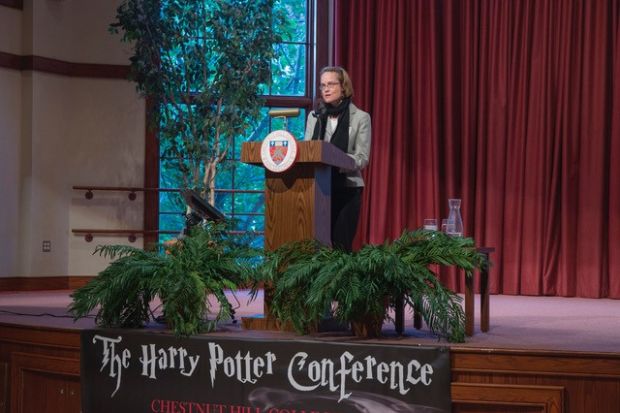It has soaring cylindrical French Gothic towers, arched windows, gables, and a vaulted ceiling with stained-glass skylights, on bucolic wooded grounds where students compete in quidditch.
For all of its similarity to another, more familiar institution of learning, however, the stairs that wrap around the 95-foot Graeco-Roman rotunda of Saint Joseph Hall do not move, and neither do the figures in the portraits on the walls. The forest is not forbidden. The owls mostly stay outside.
Still, for two days this autumn, the historic building at Chestnut Hill College in a leafy neighbourhood of Philadelphia will host one of the world’s most unusual annual academic conferences, about magic, fantasy, and the surprising depth of meaning in the Harry Potter canon.
The eighth annual Harry Potter Academic Conference, planned for mid-October at Chestnut Hill, is a serious discussion of themes from the books by scholars from a diverse range of disciplines – and about ways that they can be used to engage the generation of students who grew up with them.
It’s a subject gradually winning acceptance among academics, or at least more than it got when the conference started. An early panel was about “how much it cost all of us to come out as people who were studying Harry Potter”, said Patrick McCauley, an associate professor of chemistry at Chestnut Hill and one of the organisers.
Back then, said Karen Wendling, the co-creator and another associate professor of chemistry, colleagues derisively asked her if presenters would be dressing up in capes and hats. So she posted the participants’ impressive credentials and affiliations with universities all over the world, and the sniping stopped.
Although there is still the occasional mocking comment, the website Academia.edu today lists 340 dissertations and research studies on Harry Potter-related topics (“Harry Potter and Neoliberal Education Reforms”, “Trauma, Harry Potter, and the Demented World of Academia”, “What Harry Potter Teaches Us About Modern British Politics”) and the conference and the subject it addresses are gaining new respect.
“It’s to our detriment to not look at the ways in which young adult literature is reaching our students,” said Sarah Hentges, associate professor of American studies at the University of Maine and this year’s plenary speaker (“Girls on Fire: Transformative Heroines in Harry Potter and Young Adult Literature”).
“These novels are reaching such a wide swathe of people,” Dr Hentges said. “It’s a cultural phenomenon that’s worth understanding.”
This year’s conference will also feature a history professor on “The Wizarding World’s Imaginative Geographies” and a graduate student reading from a paper about the social dynamics of love potions. Previous presenters have considered quidditch and cultural imperialism, the genetics of inheriting magical abilities and sexual imagery in the Chamber of Secrets, as well as child abuse, violence against women, and male sexuality and homosocial relationships in the wizarding world.
“If you can make a Harry Potter connection in a scholarly way, we want to hear from you,” said Christopher Bell, an associate professor of media studies at the University of Colorado and last year’s plenary speaker (“Privileged Potter: Rowling’s Critical Whiteness Model”), who is also Harry Potter studies area chair for the Southwest Popular/American Culture Association.
A few people do, in fact, wear costumes to the conference, and the campus quidditch team hosts a tournament that coincides with it. And while the organisers draw the line at some things – they have rejected people who wanted to come and read fan fiction, for example – they will accept presenters who are not academics, and have added a Harry Potter essay writing contest for secondary school students.
“One of the most basic tenets of popular culture study is that popular culture is our entrée into conversation when we have seemingly nothing else in common,” Dr Bell said. “There’s always a period when people are, like, ‘Are you seriously studying that?’ and when so-called traditional academics look down their noses at popular culture.”
The Harry Potter series, though, is the best-selling in history, and has been translated into 80 languages.
“The fact that people would look at this and say, ‘Why is anybody studying this?’ – that’s what’s laughable,” Dr Bell said.
There is another benefit to hosting the conference, said Dr McCauley. Chestnut Hill is a modest Catholic campus of fewer than 2,000 students started by nuns, once housed entirely in that grand hall. And the annual event is starting to attract attention from prospective students and faculty in a crowded and competitive market.
“Small liberal arts colleges like this one are becoming a harder sell out there,” Dr McCauley said. “They have to find ways to distinguish themselves.”
After all, he said, “We don’t have a lot. But we have Hogwarts.”
POSTSCRIPT:
Print headline: Hogwarts and critical whiteness: Harry Potter studies comes of age
Register to continue
Why register?
- Registration is free and only takes a moment
- Once registered, you can read 3 articles a month
- Sign up for our newsletter
Subscribe
Or subscribe for unlimited access to:
- Unlimited access to news, views, insights & reviews
- Digital editions
- Digital access to THE’s university and college rankings analysis
Already registered or a current subscriber? Login








